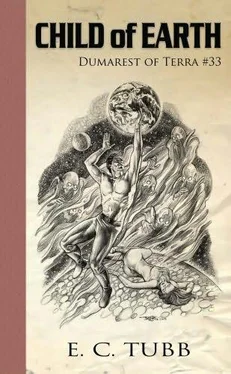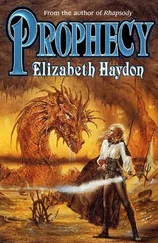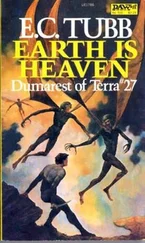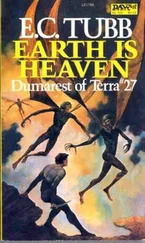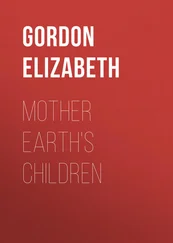E. Tubb - Child of Earth
Здесь есть возможность читать онлайн «E. Tubb - Child of Earth» весь текст электронной книги совершенно бесплатно (целиком полную версию без сокращений). В некоторых случаях можно слушать аудио, скачать через торрент в формате fb2 и присутствует краткое содержание. Жанр: Фантастика и фэнтези, на английском языке. Описание произведения, (предисловие) а так же отзывы посетителей доступны на портале библиотеки ЛибКат.
- Название:Child of Earth
- Автор:
- Жанр:
- Год:неизвестен
- ISBN:нет данных
- Рейтинг книги:4 / 5. Голосов: 1
-
Избранное:Добавить в избранное
- Отзывы:
-
Ваша оценка:
- 80
- 1
- 2
- 3
- 4
- 5
Child of Earth: краткое содержание, описание и аннотация
Предлагаем к чтению аннотацию, описание, краткое содержание или предисловие (зависит от того, что написал сам автор книги «Child of Earth»). Если вы не нашли необходимую информацию о книге — напишите в комментариях, мы постараемся отыскать её.
Child of Earth — читать онлайн бесплатно полную книгу (весь текст) целиком
Ниже представлен текст книги, разбитый по страницам. Система сохранения места последней прочитанной страницы, позволяет с удобством читать онлайн бесплатно книгу «Child of Earth», без необходимости каждый раз заново искать на чём Вы остановились. Поставьте закладку, и сможете в любой момент перейти на страницу, на которой закончили чтение.
Интервал:
Закладка:
“Charity,” said Shandaha. “From those dealing in superstition. How did you escape contamination?”
“There was neither contamination or superstition. The Church of Universal Brotherhood is a potent force for good throughout the galaxy. The monks have dedicated their lives to giving help and easing the torment of those in need.”
“So they would have you believe.”
“So I have seen.” Dumarest studied his host wondering ifhis attitude was genuine or a pretence. Another ploy leading to some conclusion that would reveal his failure in the realm of logic. A continuation of the elaborate game of which he seemed to be a part. “The universe is rotten with poverty and disease. The monks offer counsel, advice, medical aid and what goods and comfort they can provide.”
“In return for an unquestioning belief in their deity. For total obedience to their dictates.”
“The monks make no demands. There is no ritualized worship. Just the basic teaching that if all could be brought to recognize the truth of the credo-there, but for the grace of God, go I-the millennium will have arrived.”
“God?”
“Fate. Destiny. Luck. Chance-call it what you choose,” snapped Dumarest. “Maybe there is a supreme being somewhere in the universe, the original creator and, for convenience, we call it God.”
“And you?”
Dumarest made no answer, sitting, remembering a tall gaunt figure in a shabby homespun robe, sandals on callused feet, scarred hands twisted with arthritis and torments endured when he was young. Brother Edom, a kind and gentle man. One who maintained a warmth and depth of compassion which Dumarest had found hard to understand.
“Think of God as a concept,” he had said. “As a word symbolizing a whole. A total of goodness, perhaps. Of tolerance. Of kindness. Of compassion. Or as a friend, an elder brother or a trusted companion. As a protector or a loving, forgiving, father. Or simply as someone or something always better than we are, for all of us fall into error. Or sin if you prefer to call it that. Acts done with deliberate intent or from unthinking ignorance. Deeds that cause hurt to others yielding physical, mental or emotional distress. Sometimes the guilt of doing such deeds is too much to bear and so the perpetrator seeks forgiveness. Absolution.”
Hence the lamp held in a small compartment. The Benediction Light beneath which a supplicant knelt and confessed his sins to the attendant monk who listened and soothed and gave comfort together with the hypnotic command never to kill.
Dumarest had never knelt before the Benediction Light.
Lying in a semi-coma on a cot close to the inner sanctum he had heard the babble of the supplicants and the measured response of the attendant monks. The comfort they gave and how they gave it. Things he had learned as he had learned of the conditioning-a thing he could do without. If he’d had it he would have died when attacked on the clearing.
Dumarest sipped at his wine, looking at the beauty of the goblet, the table, the furnishing and decoration of the chamber in which they sat. This time it resembled the interior of a tent, one adorned with swathes of shimmering silk and esoteric patterns. Luxury at total variance with the small church he had known in which the monks had helped him win his battle to live. Here was light and the sweet scent of perfume. Then had been the stench of poverty with all that entailed.
“Earl-”
“Yes, I know, you want answers and quickly. So do I. Does it make you a god because you can give or withhold them? That you have the power of life and death? We all have that; the ability to kill or not to kill. Is that your definition of a deity? The concept of a being with awesome power, unpredictable desires, an inflated ego and the ability to pander to any whim regardless of its effect on others? If so you aren’t talking about a god-you’re talking about a megalomaniac.”
“Is that what you think?”
“Do you give a damn what I think?” Dumarest looked at the goblet in his hand then carefully set it on the table. The wine was unexpectedly strong. “Life is a gamble,” he said. “A game of chance. The cards are dealt and each gets a hand. It can be worthless, have potential value, have value of a kind, or be unbeatable. You improve it if you can. Otherwise you just make do.”
“A cynical point of view, Earl. One I would not have expected from a man of action such as yourself. Yet, if you had been indoctrinated to believe that all is foreordained, then there would be no point in trying to improve your situation. If God deals the cards then God must have decided your station. Which proves that God must be omnipotent.”
“Omniscient,” corrected Dumarest. “You don’t need total power to deal out a hand of cards. You just hand them out and let luck take care of the rest. But if you want to fix the deal you need to have knowledge.”
“As you would know.” Shandaha shrugged, “So we have managed to resolve the nature of God. A crooked card-dealer. A novel proposition but one I find hard to accept.”
“I’m not talking about God. I’m talking about luck. Life is a gamble all along the line. Who we are, what we are, all the rest of it. The random products of chance.”
“Perhaps. You have a point but I doubt if the monks would agree. How long did you stay with them?”
“About a year.”
“And then?”
“I moved on. The Church held attraction but it wasn’t for me.”
“You hated wearing the robe, the begging, the need, always, to be humble?”
“Something like that.”
“Their pacifism?”
“That too.” Dumarest looked at his hands, remembering those of the old monk, trying to imagine what it must have been like for him to have suffered the agony of broken joints and torn flesh. Knowing that he could never accept their creed of peace, accepting torment hoping, that by example, they would teach their tormentors the futility of inflicting agony.
Not in a universe where life itself was a continual act of violence.
“And then?”
“Hsi Wei taught me how to survive.”
He had remembered the man when lying in satiated lethargy with Nada before opening the door that had led to his past. Hours ago? Minutes? There was no way to tell. Drugs could alter the apparent passage of time and he could have relived previous experiences at an accelerated rate. Most probably had done but there was nothing he could do about it. Now he simply sat, thinking, assessing Shandaha’s reluctance to accompany him on the pain-wracked journey to the church. His host did not seem to relish pain and Hsi Wei had provided more than enough of that.
“A lesson accompanied with pain is a lesson never to be forgotten.”
His personal credo founded on years of experience and primitive teaching, backed by the generous use of the thin cane looped to his wrist. One he used to emphasize every facet of the information he regarded as essential to the art of personal survival.
“Learn the major areas of maximum sensitivity to physical attack.” A pause as the tip of the cane touched points on an anatomical chart. “The genitals, the throat, the larynx, the eyes, the ears. Boned structures such as the jaw, the temple, the cheek, the neck. Repeat!” The lash of the cane as he was obeyed. “Again! Again!”
Anatomy, circulation, the placement of nerves that, when correctly struck, would result in pain and temporary paralysis. Practice bouts with one student set against another, then against a pair, a trio, more. All to find the art of determining how and if to attack, when, which to strike first.
“In any unavoidable conflict the basic rule is to strike first, fast, and furiously.” The sting of the cane. “Repeat! Repeat!”
Tuition, practice, learning which opened doors he had barely known existed. There were more ways than one to resolve a situation. More subtle methods than direct attacks. Actual physical conflict was to be avoided whenever possible but, when by necessity used, to be short, sharp and final. A dead opponent was harmless, an injured one was not. Mercy was a weakness and warnings a waste of time. Things Dumarest had painfully learned together with the wisdom of masking his actions from official scrutiny.
Читать дальшеИнтервал:
Закладка:
Похожие книги на «Child of Earth»
Представляем Вашему вниманию похожие книги на «Child of Earth» списком для выбора. Мы отобрали схожую по названию и смыслу литературу в надежде предоставить читателям больше вариантов отыскать новые, интересные, ещё непрочитанные произведения.
Обсуждение, отзывы о книге «Child of Earth» и просто собственные мнения читателей. Оставьте ваши комментарии, напишите, что Вы думаете о произведении, его смысле или главных героях. Укажите что конкретно понравилось, а что нет, и почему Вы так считаете.
